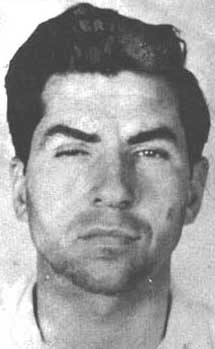Lucky Luciano (Salvatore Lucania)

Lucky Luciano
Organized Crime Figure. Born to Antonio and Rosalia Lucania, Lucky had four other siblings, Bartolomeo born in 1890, Giuseppe born in 1898, Filippia born in 1901, and Concetta. His father worked in a sulfur mine in Sicily. When Lucky was 10 years old, the family immigrated to the United States. They settled in New York City in the borough of Manhattan on its Lower East Side, a popular destination for Italian immigrants. While he worked as a clerk for a hat company for some time, he managed a budding criminal career as well. The teenaged Lucky befriended Jewish gang members Meyer Lansky and his associate Benjamin “Bugsy” Siegel, who would become two of his most important allies. He also became affiliated with Guiseppe “Joe the Boss” Masseria’s criminal operation. Lucky got involved in dealing drugs, which led to his first major run with the law in 1916. He was caught selling heroin and served six months at a reformatory for the crime. Lucky became one of the “Big Six” of bootlegging along with childhood friend Meyer Lansky, Bugsy Siegel, Louis “Lepke” Buchalter, Jacob “Gurrah” Shapiro and Long Zwillman. These unscrupulous characters dominated the illegal liquor trade on the East Coast. Lucky was also an associate of Arnold Rothstein, also known as the Big Bankroll, who had gambling and bootlegging operations. Luciano lived up his nickname “Lucky” by surviving a savage attack. He had been abducted by a group of men, who beat and stabbed him. Left for dead on a beach in Staten Island, Lucky was discovered by a police officer and taken to the hospital. Lucky had worked for Masseria for years, but he later supported Marazano. He helped arrange for Masseria to meet a grisly end in April 1931 with this action the Castellammarese War was over. Maranzano divided all the Italian-American gangs in New York City into Five Families. As per his original deal with Maranzano, Lucky took over the old Masseria gang. The other four families were headed by Maranzano, Profaci, Gagliano, and Vincent Mangano. Maranzano promised that all the families would be equal and free to make money. However, at a meeting of crime bosses in Upstate New York, Maranzano declared himself capo di tutti capi, the absolute boss of all of the crime families. Maranzano also whittled down the rackets of the rival families in favor of his own. Lucky appeared to accept these changes, but was merely biding his time before removing Maranzano. Unfortunately for Lucky, Marazano soon viewed him as a threat and ordered a hit on him. But Lucky was able to strike him first, having some of his men take out Marazano in his office in September 1931. With the death of Maranzano, Lucky became the dominant organized crime boss in the United States. He had reached the pinnacle of America’s underworld, directing criminal rules, policies, and activities along with the other family bosses. Lucky also had his own crime family, which controlled lucrative criminal rackets in New York City such as illegal gambling, bookmaking, loan-sharking, drug trafficking, and extortion. He became very influential in labor and union activities and controlled the Manhattan Waterfront, garbage hauling, construction, Garment Center businesses, and trucking. In June 1935, New York Governor Herbert H. Lehman appointed U.S. Attorney Thomas E. Dewey as a special prosecutor to combat organized crime in New York City. In 1936 Lucky and eight members of his vice racket were brought to trial. Convicted on extortion and prostitution charges in June, he was sentenced to 30 to 50 years in jail. Lucky was sent to the Clinton Correctional Facility in Dannemora, New York. While in prison, Lucky offered to help in the war effort during World War II by using his criminal connections in Italy to advance the Allies’ cause. After the war, he received parole and a deportation order. He went back to Italy briefly and then traveled to Cuba. There he met up with some of his old cohorts in crime, including Meyer Lansky and Bugsy Siegel. In 1947, the Cuba government sent Lucky back to Italy where he remained under close surveillance. He was not allowed to leave Naples, where he spent the remainder of his days.
Born
- November, 24, 1897
- Sicily, Italy
Died
- January, 26, 1962
- Sicily, Italy
Cause of Death
- Heart attack
Cemetery
- Saint John Cemetery
- Queens, New York




